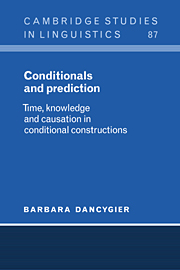Book contents
- Frontmatter
- Contents
- Acknowledgments
- 1 Conditionals as a category
- 2 Prediction and distance: time and modality in conditional clauses
- 3 Relations between the clauses in conditional constructions
- 4 Knowledge and conditional protases
- 5 Conditional clauses: form and order
- 6 If and other conditional conjunctions
- 7 Conclusion: prototypical conditionality and related constructions
- Bibliography
- Index of names
- Subject index
6 - If and other conditional conjunctions
Published online by Cambridge University Press: 22 September 2009
- Frontmatter
- Contents
- Acknowledgments
- 1 Conditionals as a category
- 2 Prediction and distance: time and modality in conditional clauses
- 3 Relations between the clauses in conditional constructions
- 4 Knowledge and conditional protases
- 5 Conditional clauses: form and order
- 6 If and other conditional conjunctions
- 7 Conclusion: prototypical conditionality and related constructions
- Bibliography
- Index of names
- Subject index
Summary
The purpose of this book, as stated in the introduction, is to describe complex sentences whose subordinate clauses are introduced with if. This is the class of sentences which I have been calling “conditionals.” Different analysts, however, broaden or restrict the application of the term in a number of ways. For instance, logical accounts disregard constructions with questions and imperatives as q's, some analyses (e.g. Ramsey 1931) do not consider even if sentences to be conditionals, Austin (1961) doubts the conditional status of speech act sentences, and even Jespersen talks about “pseudo-conditionals.” Using yet another set of criteria, it is common to apply the term “conditional” to any sentence which can be paraphrased as a conditional.
In what follows I will try to show that, taking if to be the only explicitly conditional form in the English conjunction repertory, we can still offer a consistent explanation of if-compounds (such as even if) and of other conjunctions traditionally linked to conditionality: unless (as a negative marker of the protasis) and then (as a marker of the apodosis). In the final chapter I will also discuss the ways in which conditional meanings can arise without the presence of any overt markers.
Concessive conditional constructions
We have seen throughout this work that if … then constructions share important aspects of form and interpretation with constructions containing other types of adverbial clauses, in particular temporal and causal ones. As was noted by König (1986), concessive clauses should also be added to this list.
Information
- Type
- Chapter
- Information
- Conditionals and PredictionTime, Knowledge and Causation in Conditional Constructions, pp. 160 - 183Publisher: Cambridge University PressPrint publication year: 1999
